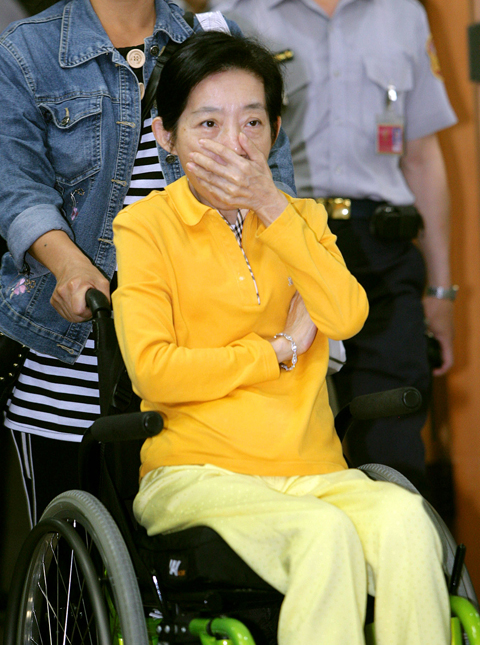Former first lady Wu Shu-jen (吳淑珍) yesterday denied taking bribes and profiteering in the first pre-trial hearing for a second wave of charges brought against her.
She said that she received NT$300 million (US$9.2 million) in political donations from former Chinatrust Financial Holding Co vice chairman Jeffrey Koo Jr (辜仲諒) and admitted that she violated the Political Donation Act (政治獻金法) because she did not report them.
However, she denied that the money she took from Koo and former Taipei Financial Center Corp chairwoman Diana Chen (陳敏薰) were bribes or illegal gains, adding that she didn’t use the money for personal expenses.

PHOTO: CNA
On May 5, prosecutors said they had concluded the second part of the investigation into the former first family. They charged former president Chen Shui-bian (陳水扁) and his wife with taking bribes, profiteering and violating the Political Donation Act.
Prosecutors accused the former president and his wife of accepting NT$10 million in bribes from Diana Chen.
Prosecutors alleged that Diana Chen gave the former first lady NT$10 million to secure the presidency of Grand Cathay Securities Corp (大華證券).
The indictment also accused the couple of inappropriately taking NT$300 million in political donations from Koo.
Prosecutors accused the former president of using election campaign funds and secret foreign relations as excuses to ask Koo for donations, which the couple then pocketed.
Separately, in response to her daughter, Chen Hsing-yu (陳幸妤), being charged with perjury on Wednesday, Wu told reporters: “I respect the judicial system.”
TV footage showed her grim-faced yesterday morning as she prepared to take the high-speed rail to Taipei for the hearing.
Before Wednesday, Chen Hsing-yu had been the only immediate family member of Chen Shui-bian not named as a defendant in relation to the former first family’s alleged money laundering activities.

Chinese spouse and influencer Guan Guan’s (關關) residency permit has been revoked for repeatedly posting pro-China videos that threaten national security, the National Immigration Agency confirmed today. Guan Guan has said many controversial statements in her videos posted to Douyin (抖音), including “the red flag will soon be painted all over Taiwan” and “Taiwan is an inseparable part of China,” and expressing hope for expedited reunification. The agency last year received multiple reports alleging that Guan Guan had advocated for armed reunification. After verifying the reports, the agency last month issued a notice requiring her to appear and explain her actions. Guan

GIVE AND TAKE: Blood demand continues to rise each year, while fewer young donors are available due to the nation’s falling birthrate, a doctor said Blood donors can redeem points earned from donations to obtain limited edition Formosan black bear travel mugs, the Kaohsiung Blood Center said yesterday, as it announced a goal of stocking 20,000 units of blood prior to the Lunar New Year. The last month of the lunar year is National Blood Donation Month, when local centers seek to stockpile blood for use during the Lunar New Year holiday. The blood demand in southern Taiwan — including Tainan and Kaohsiung, as well as Chiayi, Pingtung, Penghu and Taitung counties — is about 2,000 units per day, the center said. The donation campaign aims to boost

A preclearance service to facilitate entry for people traveling to select airports in Japan would be available from Thursday next week to Feb. 25 at Taiwan Taoyuan International Airport, Taoyuan International Airport Corp (TIAC) said on Tuesday. The service was first made available to Taiwanese travelers throughout the winter vacation of 2024 and during the Lunar New Year holiday. In addition to flights to the Japanese cities of Hakodate, Asahikawa, Akita, Sendai, Niigata, Okayama, Takamatsu, Kumamoto and Kagoshima, the service would be available to travelers to Kobe and Oita. The service can be accessed by passengers of 15 flight routes operated by

The Kaohsiung Tourism Bureau audited six hotels in an effort to prevent price gouging ahead of Korean band BTS’ concert tour in the city scheduled for Nov. 19, 21 and 22 this year. The bureau on Friday said that the audits — conducted in response to allegations of unfair pricing posted on social media — found no wrongdoing. These establishments included the local branches of Chateau de Chine, Hotel Nikko, My Humble House, and Grand Hai Lai, it said, adding that the Consumer Protection Commission would have penalized price gougers had the accusations been substantiated. The bureau said the Tourism Development Act